CONSERVATIONIST VS DEPUTY PRESIDENT MABUZA
Assassins, elephants and sweating advocates in Barberton Mountain Lands
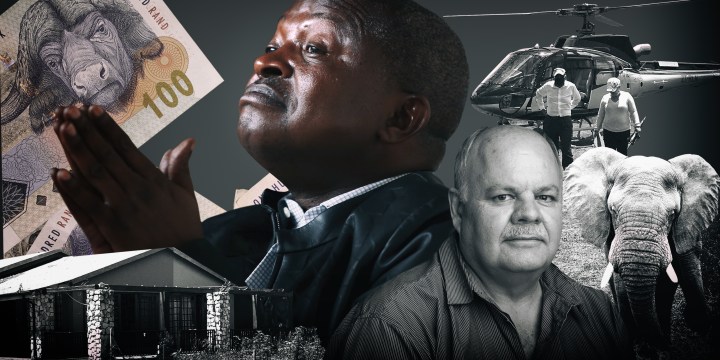
On a scorching weekday in early February, case number 35402/2010 of the Pretoria High Court travelled to the Barberton Mountain Lands, for an in loco inspection of the nature reserve formerly known as Nkomazi Wilderness. What the court saw, with counsel for Deputy President DD Mabuza in attendance, were the sites of more than a few allegedly heinous crimes. So was a good time had by all? Perhaps not.
I. Conspiracy to murder
“There were quite serious rumours of an assassin, a shooter, on the farm,” said Athol Stark, “this house was where Fred and his family were forced to flee.”
It was nearing 11am on the morning of 1 February 2022, and Stark — a legendary Mpumalanga tour guide, the man who had mapped the cultural and ecological wonders that would become the Highveld Heritage Route — was driving the lead vehicle on Judge Cassim Sardiwalla’s in loco inspection of the nature reserve formerly known as Nkomazi Wilderness.
“Can you please stop for us to take a few photographs,” requested the judge, as his registrar, Leonora McKenzie, leaned out the window with the camera app at the ready on her phone.
The vehicle stopped for McKenzie to get her shots, a picture of a single-storey home with generous verandahs, the garden and the driveway now overgrown with weeds. But what the judge may or may not have known was that Stark, uncharacteristically, had gotten his facts wrong — this was not the home that conservationist Fred Daniel and his family had been forced to flee to because of an alleged assassin; it was the home they had been forced to flee from.
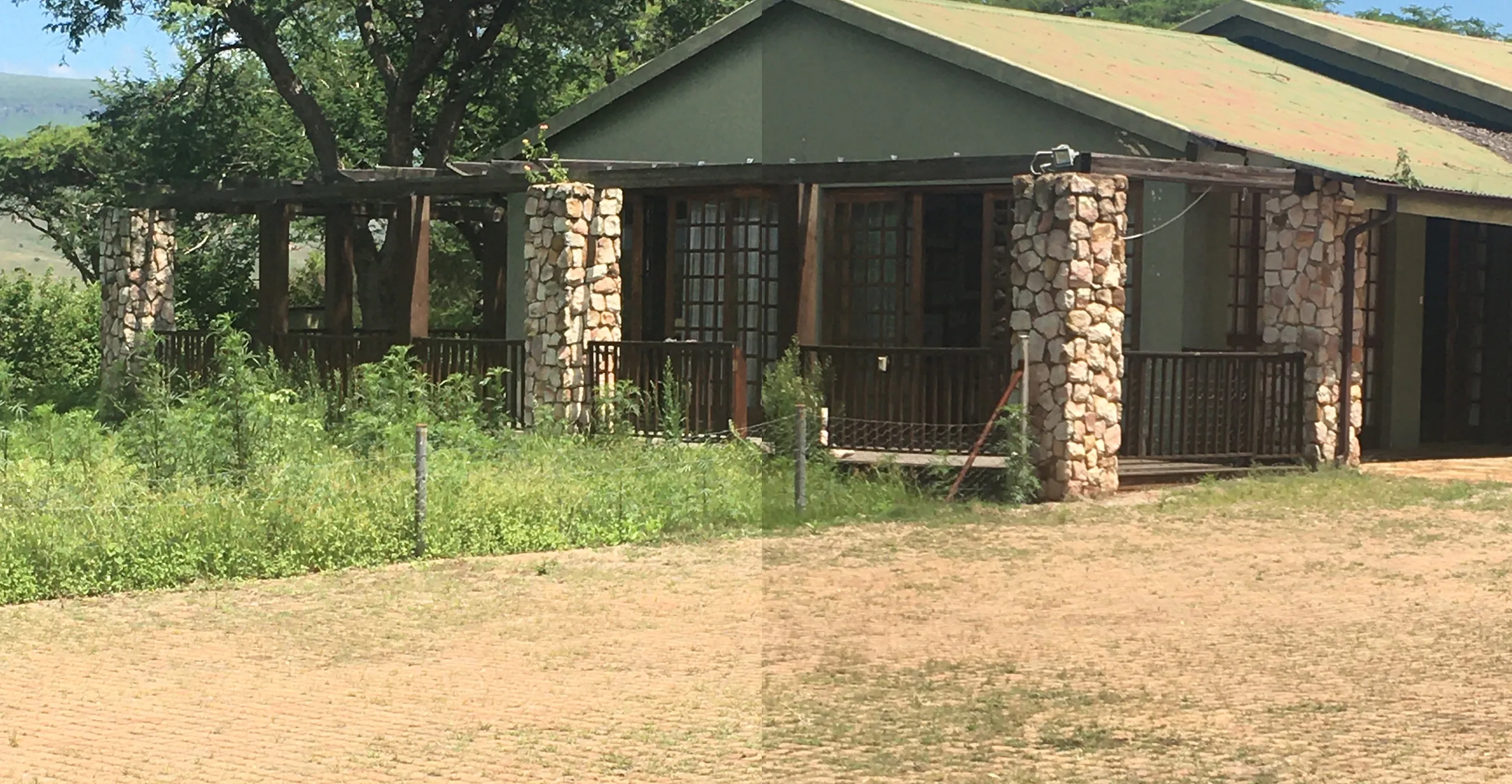
The home that Fred Daniel and his family occupied from 2008 to 2017. (Photo: Kevin Bloom)
Daniel, as Daily Maverick had learnt in previous interviews with the founder of Nkomazi Wilderness, had moved into the house in May 2008, soon after he had sold the remaining half of the reserve to the state-owned Emirati company Dubai World. From this house, Daniel and his wife Linda had watched — through binoculars — as about a hundred protesters had stormed the property in August 2008, scaling the fences and tearing them down with crowbars.
Thirteen years later, as reported by Daily Maverick, the same violent protest would be described in detail by Kobus Vermeulen, during his testimony before the Pretoria High Court. A former detective inspector with the Badplaas branch of the South African Police Service, Vermeulen would recall for Judge Sardiwalla how the police had mysteriously been ordered “not to get involved” — and so, he would testify, he had driven out to the property in civilian clothes to check for himself.
Conservationist vs David Mabuza: Court hears evidence of massive land claims fraud
The protest was eventually quelled, Vermeulen told the court, when “Mr David Mabuza arrived on the scene.”
“I remember he was standing on the back of a bakkie and he was addressing people with a megaphone,” the witness concluded, referring to the future deputy president of South Africa, who at the time was the MEC for agriculture and land affairs in Mpumalanga province. “He basically applauded them and told them not to worry, that the land will be given back to its lawful claimants.”
What exactly it was that Daniel had seen from his vantage point up on the hill that day, how he felt and where he placed the protest within the broader context, would presumably come to light during the week of 7 February 2022 — when, as per Daily Maverick’s intel, he was due to offer his own testimony in the R1-billion civil action that he had launched against the Mpumalanga Tourism and Parks Agency and another 24 government entities back in July 2010.
Either way, it was in November 2018, when his son Jesse was eight years old, that Daniel and his family would finally flee the home. And contrary to Stark’s observation, it wasn’t the “rumours of an assassin” that would force him to flee; it was the affidavit of a certain Nomfundo Sambo (alias Thandeko Mabuza, Deputy President Mabuza’s alleged niece), warning him that not one but three assassins were on their way to Badplaas, with the intention to kill him and his family “at the behest of Mr Mabuza”.
In a sworn statement, signed by a commissioner of oaths on 1 December 2018, Daniel had testified to the following after taking an early evening call from Sambo:
“Alarmed, I put the phone down and immediately took my shotgun out of the safe and warned my wife about the threat of an imminent attack on us. I instinctively believed that the most likely plan would be to stage a farm murder, as I have been able to identify a pattern in which Mr Mabuza and/or his henchmen stage events in order to harass and intimidate me.”
As it turned out, although Daniel and his wife had decided to inform Jesse — “we have learnt over the years,” he testified, “that honesty and transparency is the only way to deal with the threats we have had to face” — the plan may have been way more elaborate than either of them could have guessed at the time.
In October 2020, with Daniel and his family now ensconced in a secret location far away from Badplaas, the City Press journalist Size sama Yende (author of the book Eerie Assignment: A Journalist’s Nightmare in Mpumalanga) reported that Sambo had been sentenced to seven years in prison for “concealing her identity and using a pseudonym”. She had, it transpired, pleaded guilty to the charge to avoid being cross-examined.
So why had Sambo pretended to be the deputy president’s niece?
“Daniel said he was not satisfied with the police investigation because he was stopped from giving his statement,” Yende reported, “and claimed that R750,000 that was deposited into Sambo’s account after making the allegation was not investigated.”
Daniel’s contention, in a nutshell, was that Deputy President Mabuza had paid Sambo to trap him into laying a false accusation of conspiracy to murder — a crime that would expose him to a heavy prison sentence.
II. Too many elephants
“There used to be enormous numbers of giraffe here,” said Stark, as the convoy proceeded through the northern sector of Daniel’s abandoned nature reserve. “They would come for the acacias.”
Judge Sardiwalla had already seen the derelict wildlife sanctuaries, heard Daniel talk about his plans to incorporate Nkomazi Wilderness into Africa’s seventh Transfrontier Park and learnt that this specific section of the reserve was set aside for day visitors, including schoolchildren from the area.
“Are there any animals left out here,” asked the judge.
“No,” replied Stark.
“Not at all, you’re saying?”
“Not at all.”
Half an hour later, the judge’s in loco inspection was taking in the rundown conference centre, the empty curio shop and the desiccated indigenous plant nursery near the main entrance gate. Then, it was time to board the helicopter. The first trip was a short flip to Komati Springs, an old mine that Daniel had rehabilitated in 2002, reworking it alongside his partner Don Shirley into a world-renowned cave-diving site.
After a short break for snacks, the chopper was up in the air again. This time, with Daily Maverick in close attendance, it was a much longer flight — over the spectacular ridges and ravines that form part of the Barberton Greenstone Belt, where 3.4-billion-year-old rock formations hold evidence of the planet’s earliest ocean, atmosphere and single-celled life. The destination was the village of Msauli, a community of unemployed mineworkers that Daniel — with Sol Kerzner’s One&Only Group — had intentions of rescuing by developing a tourism project akin to Pilgrim’s Rest.
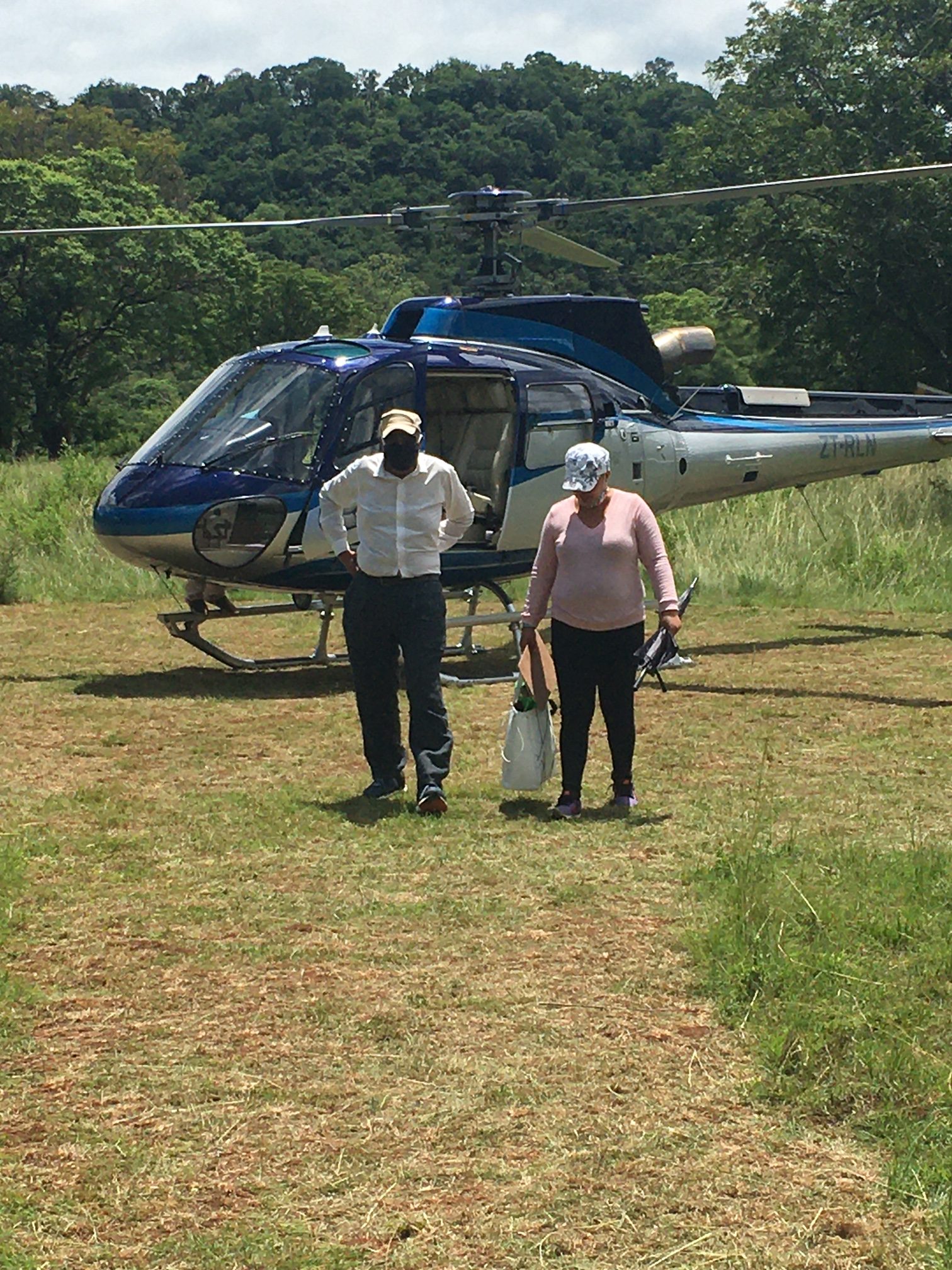
Judge Cassim Sardiwalla and his clerk, Leonora Mckenzie, emerge from the helicopter at Msauli. (Photo: Kevin Bloom)
In July 2003, as journalist Rehana Rossouw had noted in her book Predator Politics: Mabuza, Fred Daniel and the Great Land Scam, a claim had been lodged “out of nowhere” on the village.
“The only conclusion that could be drawn from the sudden appearance of this claim was that it had been manufactured to frustrate the transfer of the land to my company,” Daniel had told Rossouw. “Even when the claim proved to be for compensation only, the parks board and the regional Land Claims Commission ensured that the transfer was not finalised. The deal collapsed and the village has since gone to ruin.”
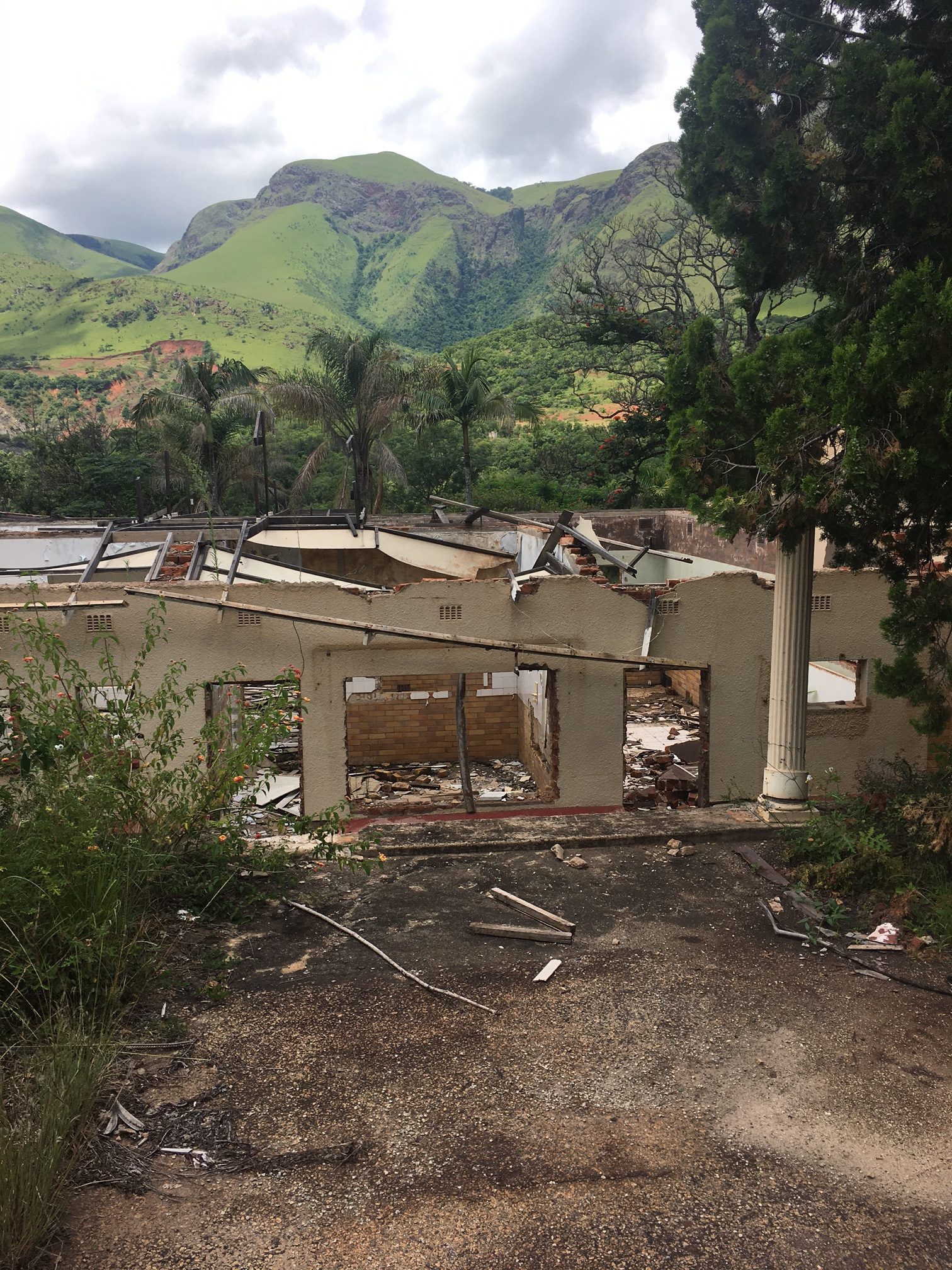
The ruins of Msauli. (Photo: Kevin Bloom)
The Msauli visit was followed by lunch at a five-star tented camp on the banks of the Komati River, a private lodge that Daniel had built as part of his original 39,000-hectare “Cradle of Life” project, but that had since been hived off into the 17,000 hectares of the Nkomazi Game Reserve. Out on this southern edge of the former Nkomazi Wilderness, there was indeed wildlife — including hartebeest, waterbuck, hyena, cheetah and lion. The most contentious animals, however, were the elephant; there were apparently 18 of them, and Daniel’s allegation was that they were doing major damage to the ecosystem.
As Daily Maverick reported in the second part of our “Dead Matter” series, published in March 2021, Daniel had for years been seeking authorisation from the Mpumalanga Tourism and Parks Agency to reintroduce the “Big 5”. Although the MTPA’s two most senior scientists had endorsed his application for lion and elephant permits, final permission had been withheld by Jan Muller, the agency’s then-head of Wildlife Protection Services. In an affidavit that Charles Ndabeni, former CEO of the MTPA, had submitted to the Pretoria High Court in May 2020, the following was stated:
“[The] application for elephant was approved on 2 October 2007, [but] the issue of the permit was withheld by Jan Muller, and issued to Dubai World in September 2008, which included permits to reintroduce cheetah and lion.”
Dead Matter (Part Two): The lion, the conservationist and South Africa’s future deputy president
The thing was, as mentioned above, Daniel had sold his remaining 50% share in Nkomazi Wilderness to Dubai World in March 2008, after his joint venture with the Emirati company had collapsed (he had chosen to remain in the house in the northern sector while attempting, for the next nine years, to resurrect his vision). In her book, Rossouw would write that the parks agency had been “instrumental in destroying” this partnership. According to the evidence provided to Daily Maverick, which squared with the narrative in Predator Politics, the government agency (under the aegis of Muller) was all too happy to bend its own rules when it came to the “corrupt” business practices of Sultan Ahmed bin Sulayem and his Gulf-state underlings, but for Daniel — who had proved himself incorruptible — the rules were a constant brick wall.
And so back to the elephants: in 2007, environmental consultants International Conservation Services had prepared a report for Daniel, in which it was concluded that the carrying capacity for elephant in Nkomazi Wilderness was one animal per 2,000 hectares. Professor Wouter van Hoven, founder of Ecolife at the University of Pretoria, had calculated a less conservative estimate, at one per 1,000 hectares. In the event, Daniel had planned to introduce a small family herd of eight animals into a fenced-off area of 12,700 hectares, with the intention of monitoring the herd while dropping the fences into the full 39,000-hectare expanse.
With the transfer of the land to Dubai World, however, it wasn’t long before 10 elephant were introduced into a fenced-off area of 5,500-hectares, a situation that had clearly violated the permit conditions of Muller himself — among the documents that Daily Maverick had obtained during our research for the “Dead Matter” series was Muller’s authorisation, dated 2 October 2007, in which it was stipulated that “[the] area where elephant will be introduced will not be smaller than 12,700ha.”
To repeat, at the time of the in loco inspection on 1 February 2022, that original herd of 10 had reportedly grown to 18. On the drive into the tented camp, Daniel pointed out the damage to aloes, coral trees, kiepersols and various acacias. “This place has been sterilised,” he said. “What made Nkomazi Wilderness so beautiful was its diversity of indigenous trees, its floral colour, but that’s now all been destroyed.”
The elephants, then, were a major highlight of the Pretoria High Court’s travelling roadshow. And while it was in no way guaranteed that we would see them, they made their appearance at the perfect time in the script.
At the dining room table, while advocate Mike Hellens (acting for Mabuza in his personal capacity) and advocate Dawie Joubert (who had recently replaced Andre Ferreira as counsel for the MTPA) were attempting to persuade Judge Sardiwalla to revoke filmmaker Rehad Desai’s permission to shoot (Desai had for months been planning a documentary feature on Daniel), the herd suddenly appeared on the Komati River’s far bank.
Daily Maverick may have been mistaken in its assessment, but it seemed that the faces of the defendants dropped at the sight, while the faces of the plaintiffs lit up.
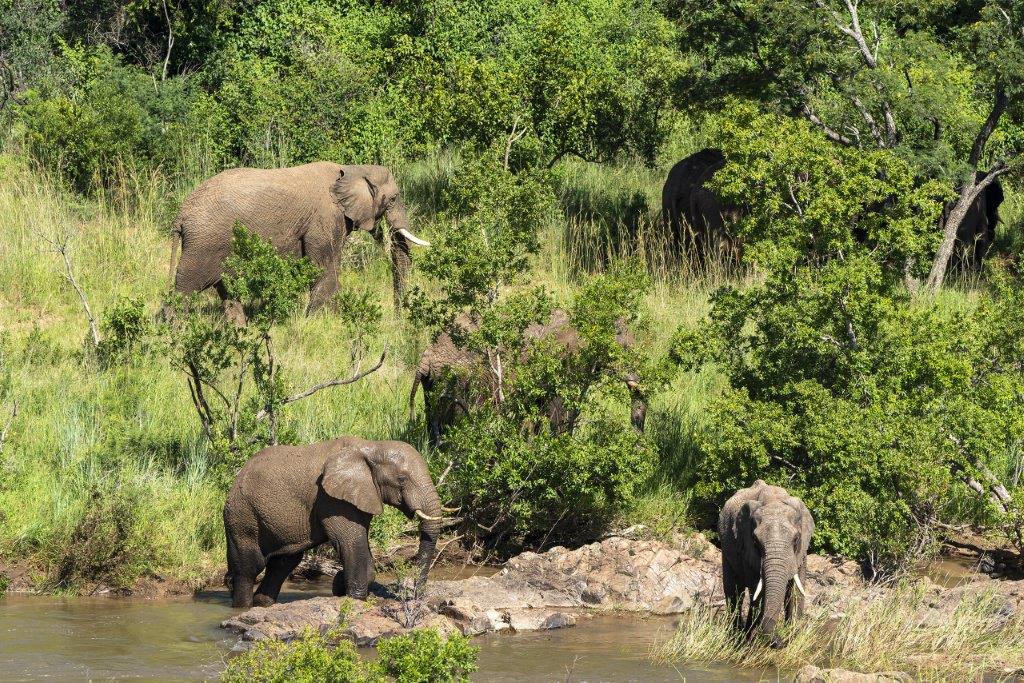
Elephants on the far bank of the Komati River, lunchtime, 1 February 2022. (Photo: Supplied)
Aside from the reputational damage to Muller, who was present at the camp, what could have been the cause of such divergent reactions?
This question could only be answered by referring to the “quantum” aspect of Daniel’s R1-billion civil suit. In 2014, as reported by Daily Maverick on 8 September 2021, forensic investigator Paul O’Sullivan was engaged by the Economic Freedom Fighters to look into land claims fraud in Mpumalanga. Soon enough, as outlined in a sworn statement that he registered with the Badplaas police (case number 47/3/2014), O’Sullivan stumbled upon “a peripheral issue, regarding unlawful land use.” This issue concerned Muller’s stipulation about the minimum area for the introduction of elephant into Nkomazi Game Reserve.
“By way of example,” O’Sullivan wrote in his sworn statement, “the change in value of land for a simple game reserve with none of the big five, might be worth in the order of R10,000 to R20,000 per hectare. However, with elephant and lion, the reserve owners could now charge large sums to overseas visitors and thereby increase the land value to as much as R50,000 per hectare. If we only work on a gain per hectare of R30,000, and on a reserve size of 9,000 hectares, then the fraud committed by the owners of [Nkomazi Game Reserve] has created a ‘benefit’ in the order of R270 million [O’Sullivan’s emphasis]. This is a minimum value.”
III. Counsel in the sun
After lunch, it was time for the in loco inspection to take in the sites arranged by counsel for the defence. Two 11-seater game-drive vehicles were waiting in the tented camp’s main driveway, with Daniel and his team making straight for one vehicle and the Hellens team for the other. Daily Maverick rode with the defendants.
Up in the front of the vehicle sat Louis Colmanet, a contractor who had been hired by Daniel to upgrade and expand the enclosures of the “Cradle of Life” animal hospital back in 2007. The first destination was the so-called “Boma,” a large enclosure set on a hill in the middle of the veld. It was the contention of Colmanet that Daniel had ordered him to build a pair of small cages behind this enclosure, “specifically hidden” so that a helicopter could not spot them from the air.
“What I can remember is that it was right here,” said Colmanet, as the judge looked on from within the shade of the second game-drive vehicle, the rest of us sweating in the searing afternoon heat. “There was a GPS location that we gave to the police.”
At this point, although he was speaking out of turn, Daniel could not help himself. “And the police found nothing,” he said.
Indeed, in an article published in the Lowvelder on 13 June 2008, it had been noted that a superintendent with the organised crime unit of the Middelburg police, Laurie Kritzinger, had obtained a search warrant for Nkomazi Wilderness — “acting on a tip-off” that Daniel was holding lions in these cages.
“Kritzinger confirmed that they found nothing illegal on the farm,” the article stated, “but insisted they acted on very reliable information from more than one source. These ‘eyewitnesses’ allegedly saw lion in cages at a certain location on Nkomazi. GPS co-ordinates were followed to the designated area, but nothing was found.”
Colmanet, it turned out, was one of the original informants — which may have been why Daniel refused to let up.
“So what was your problem with these cages, if you built them?” he asked.
“You didn’t pay us,” said Colmanet.
Daniel’s counter-allegation was that Colmanet could not be paid for work he had never done. But Hellens raised an objection. “This is cross-examination of a witness by a witness,” he complained to the judge.
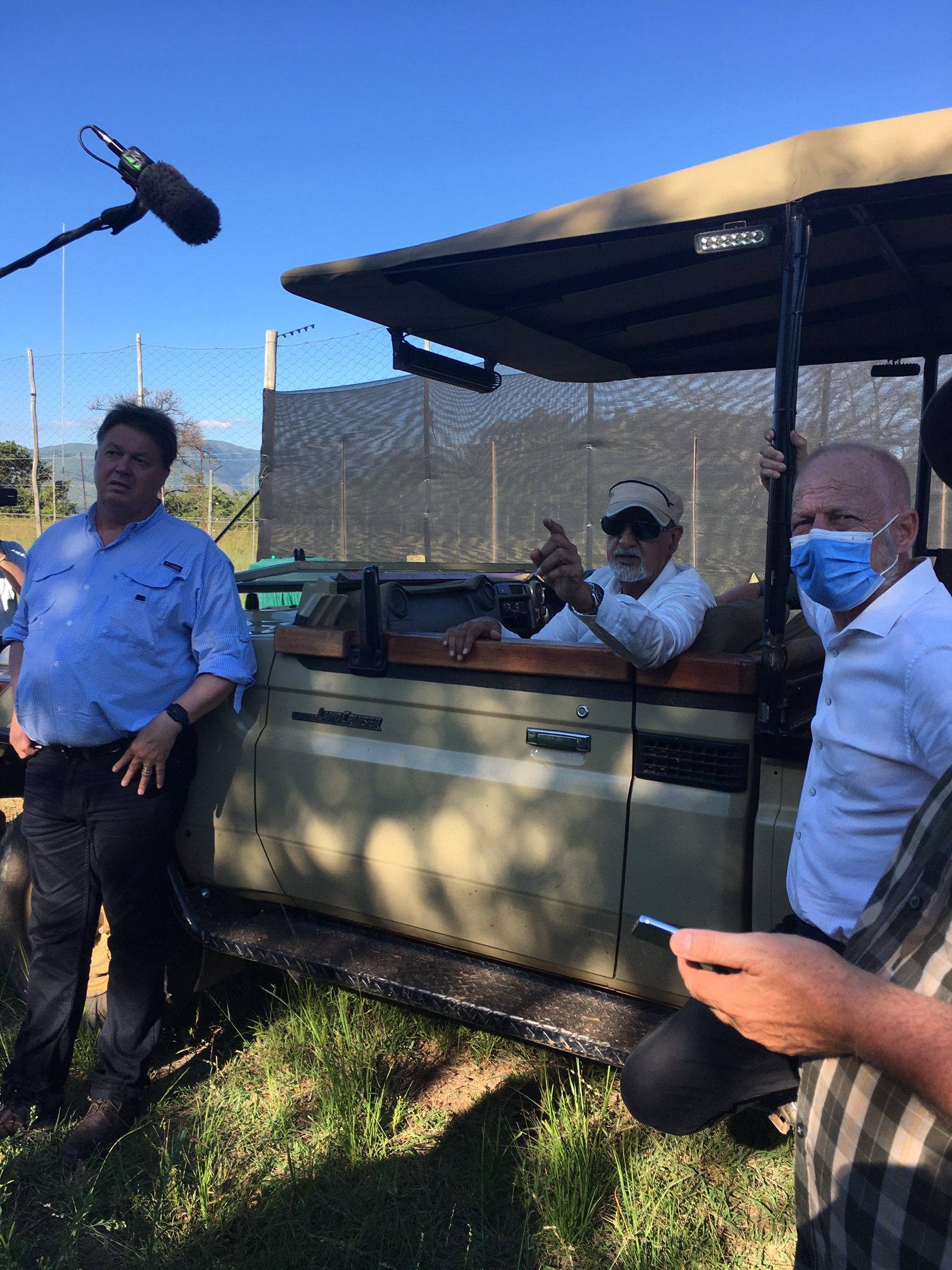
Advocate Dawie Joubert for the defendants (left) and advocate Jacques Joubert for the plaintiffs (right) look on as Judge Sardiwalla (centre) inquires about the alleged cages. (Photo: Kevin Bloom)
Then it was back in the game-drive vehicle for the defendants’ second site, Paperbark Lodge, which Daniel had upgraded into the central animal hospital and accommodation for vets and students. Once again, Colmanet pointed to where the cages had been located — although this time, emphasising that the facility was for wounded and traumatised animals, Daniel said there was “no dispute”.
With the sun now beginning to drop in the Mpumalanga sky, there was one more item on the agenda. From the helicopter, Daniel wanted to show the judge the allegedly illegal barrier fence that Dubai World had erected to “pen” the elephants within 5,500 hectares. Although there was no seat for Daily Maverick on this final flight, the word on the chopper’s return was that the fence had been successfully identified.
There was now only one question left: to whom did the day belong?
Daniel, for his part, was feeling confident. While the attempt to discredit him had raised his hackles, he was certain that it had failed. Hellens, no doubt, would argue the opposite.
But there was a matter playing out in the courts of Eswatini, where he had been acting as a prosecutor in a murder trial, that might have further discredited Hellens himself.
It had all started in September 2019, when the Times of Swaziland reported that the Law Society of Swaziland (LSS) was “vigorously opposing the application for admission” filed by Hellens. The LSS, according to the report, said that “the South African advocate who is prosecuting in the murder trial of Sipho Shongwe failed to disclose relevant information” — specifically, “that he was once charged with unprofessional conduct”.
Hellens, as the LSS had just discovered, had been charged in South Africa in 2016 with “taking a bag containing R500,000 in cash as a ‘gift’ from self-confessed tobacco smuggler and alleged fraudster Adriano Mazzotti”. The Johannesburg Bar Council, as reported by South Africa’s Sunday Times, had found that the advocate “had breached its rules by not asking for permission to accept Mazzotti’s ‘gift’ and reprimanded him”.
Ultimately, like the Johannesburg Bar Council — which, many argued, should have paid closer attention to the fact that Hellens had squashed Mazzotti’s R600-million tax bill, and was, therefore, allegedly getting rich off the proceeds of crime — the LSS would basically ignore the charge too. But in early February 2022, with Hellens still acting as prosecutor in the Shongwe trial in Eswatini, Daily Maverick would get wind of an apparent clash of dates with the Daniel trial in the Pretoria High Court.
As verified by two independent legal fraternity sources on the weekend of 4 and 5 February 2022, Hellens had committed himself to appearing in court on the Shongwe matter on 14, 15 and 16 February — despite the fact that he had known, since 2 November 2021 (when the office of the deputy judge president confirmed the dates), that he was due to represent Deputy President Mabuza in the Daniel matter over those very same days.
On the afternoon of Monday, 7 February 2022, Jacques Joubert, Daniel’s advocate, would challenge Hellens directly in court. The subtext of the challenge was that Hellens was in breach of the code of conduct of the Legal Practice Act (namely, point 20.5.1).
“I am not double-briefed,” Hellens told the judge, arguing that he had booked himself for the Swazi matter before the DJP had finalised the dates.
Judge Sardiwalla appeared to accept the answer — and so, once again, Hellens was off the hook. It was a further blow for the plaintiffs when, a few minutes later, the judge ruled that the costs of the in loco inspection should be for Daniel’s account.
On 3 February 2022, Daniel’s attorneys had addressed a letter to the state attorney, detailing why “half of the costs” for the inspection should be borne by the defendants. The full and final invoice had come to R221,504.54, they noted. As justification for the defendants’ liability, it was pointed out that “the plaintiffs are self-funded” while “the defendants are section 7(2) organs of state”.
Daniel’s attorneys also noted that “the costs of the inspection are a pittance compared to the direct and indirect costs of the litigation”.
That last figure, which took into account the previous 12 years, had been calculated by Daniel’s attorneys at somewhere north of R88-million. Asked by Daily Maverick how much of this was from his own purse, Daniel would give an estimate of R25-million. If the estimate was correct, it would mean that the South African taxpayer had funded by far the lion’s share. DM/OBP
[hearken id=”daily-maverick/9072″]





















 Become an Insider
Become an Insider
Maybe the judge should also read articles in American press about Mabuza. He shouldn’t even be in parliament let alone Deputy President god help us if Ramaphosa mysteriously dies.
I certainly wish that the NPA would pull their finger out and get on with getting this dangerous man into jail.
If Daniel’s has self funded R25 million of the estimated R88 million costs out of his own pocket, how much has Mabuza paid out of his pocket? Or are the South African taxpayers once again footing the bill to defend fraud, corruption, nepotism and Ill-gotten gains … a precedent well established by our government and the former president with his Stalingrad tactics!